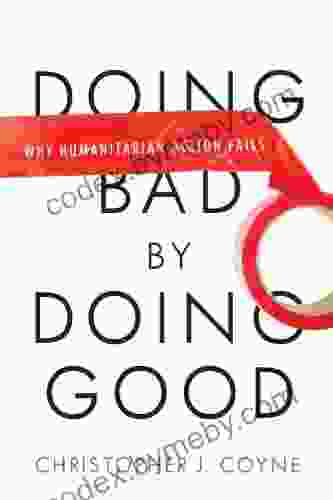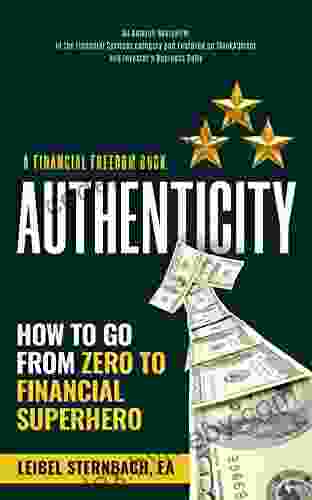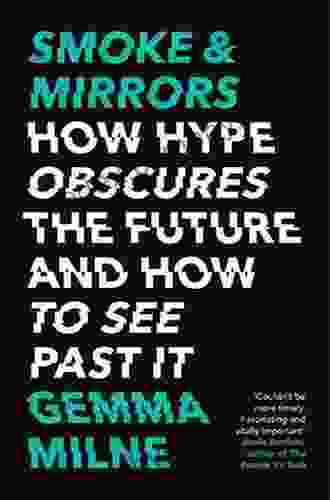Doing Bad by Doing Good: Uncovering the Hidden Dangers of Unintended Consequences

In a world where we strive to do good and make a positive impact, it is easy to assume that our actions will always lead to the desired outcomes. However, history is replete with examples of well-intentioned deeds that have resulted in unforeseen negative consequences. In his thought-provoking book, "ng Bad by ng Good," author Michael Sandel delves into the complexities of these unintended consequences and their far-reaching implications.
4.2 out of 5
| Language | : | English |
| Text-to-Speech | : | Enabled |
| Enhanced typesetting | : | Enabled |
| Word Wise | : | Enabled |
| File size | : | 2145 KB |
| Screen Reader | : | Supported |
| Print length | : | 273 pages |
Sandel argues that we must not only consider the immediate effects of our actions but also their potential ripple effects and long-term consequences. The paradoxical nature of unintended consequences often stems from the intricate web of interconnected relationships and systems that characterize our world. A seemingly harmless action, when viewed in isolation, can trigger a cascade of unintended events, often with far-reaching and detrimental effects.
Unintended Consequences in Action
Sandel provides numerous examples of unintended consequences throughout history. One such example is the Green Revolution, an initiative launched in the 1960s to increase agricultural productivity and combat hunger in developing countries. While the Green Revolution succeeded in increasing crop yields, it also led to a number of unintended consequences, including:
- Increased dependency on chemical fertilizers and pesticides, leading to environmental degradation
- Loss of biodiversity and genetic erosion
- Widening gap between wealthy farmers and subsistence farmers
Another example is the creation of lead-based gasoline in the early 20th century. Initially hailed as a major technological advancement, lead-based gasoline improved engine performance and reduced engine wear. However, the long-term consequences of lead emissions were devastating, causing widespread lead poisoning and contributing to cognitive impairments, particularly in children.
The Importance of Foresight and Ethical Decision-Making
The key to mitigating unintended consequences lies in foresight and ethical decision-making. Sandel emphasizes the need to think critically about the potential implications of our actions and to consider the broader social, environmental, and ethical contexts in which we operate. By ng so, we can identify and address potential risks and make informed choices that minimize the likelihood of unintended harm.
Ethical decision-making requires us to weigh competing values and priorities. It involves considering the potential effects of our actions not only on ourselves but also on others, both present and future. By engaging in a thoughtful and deliberative process, we can make choices that align with our values and minimize the risk of unintended harm.
Strategies for Minimizing Unintended Consequences
Sandel offers several strategies for minimizing unintended consequences:
- Identify potential risks and unintended consequences: Before taking any action, carefully consider the potential effects of your actions on all stakeholders, both directly and indirectly.
- Consult with experts and stakeholders: Seek advice from experts in relevant fields, such as scientists, economists, and ethicists. Gather input from those who will be affected by your decisions to gain a more comprehensive understanding of potential risks.
- Conduct pilot programs and experiments: Implement small-scale pilot programs or experiments to test the effectiveness and potential unintended consequences of your proposed actions before fully committing to them.
- Monitor and evaluate the results: Once you have implemented a policy or action, monitor its effects closely. Evaluate the outcomes and make adjustments as needed to mitigate unintended consequences.
In "ng Bad by ng Good," Michael Sandel presents a powerful reminder that even the most well-intentioned actions can have unintended consequences. By understanding the complexities of these consequences and embracing foresight and ethical decision-making, we can minimize the likelihood of causing harm and make choices that truly benefit both ourselves and society as a whole.
This book is an essential read for anyone who seeks to make a positive impact on the world. It is a thought-provoking exploration of the hidden dangers of unintended consequences and a valuable guide to ethical decision-making in an increasingly complex world. By embracing the principles outlined in "ng Bad by ng Good," we can strive to make our actions a force for lasting good, both for the present and for future generations.
4.2 out of 5
| Language | : | English |
| Text-to-Speech | : | Enabled |
| Enhanced typesetting | : | Enabled |
| Word Wise | : | Enabled |
| File size | : | 2145 KB |
| Screen Reader | : | Supported |
| Print length | : | 273 pages |
Do you want to contribute by writing guest posts on this blog?
Please contact us and send us a resume of previous articles that you have written.
 Book
Book Novel
Novel Page
Page Chapter
Chapter Text
Text Story
Story Genre
Genre Reader
Reader Library
Library Paperback
Paperback E-book
E-book Magazine
Magazine Newspaper
Newspaper Paragraph
Paragraph Sentence
Sentence Bookmark
Bookmark Shelf
Shelf Glossary
Glossary Bibliography
Bibliography Foreword
Foreword Preface
Preface Synopsis
Synopsis Annotation
Annotation Footnote
Footnote Manuscript
Manuscript Scroll
Scroll Codex
Codex Tome
Tome Bestseller
Bestseller Classics
Classics Library card
Library card Narrative
Narrative Biography
Biography Autobiography
Autobiography Memoir
Memoir Reference
Reference Encyclopedia
Encyclopedia Chris Mooney
Chris Mooney James Kilcullen
James Kilcullen Christina Ezrahi
Christina Ezrahi Claire Chao
Claire Chao T Chris Riley Tillman
T Chris Riley Tillman Marilyn J Hockenberry
Marilyn J Hockenberry Christopher Howard
Christopher Howard Grace Barrington Shaw
Grace Barrington Shaw James Jennewein
James Jennewein Chris Ward
Chris Ward Christopher Golden
Christopher Golden Chris Donaldson
Chris Donaldson Peter Wacht
Peter Wacht Chris Mamula
Chris Mamula Clare Pooley
Clare Pooley Susan Fletcher
Susan Fletcher Chuck Norris
Chuck Norris Malcolm Guite
Malcolm Guite Hieronymus Bosch
Hieronymus Bosch Christina Klein
Christina Klein
Light bulbAdvertise smarter! Our strategic ad space ensures maximum exposure. Reserve your spot today!
 Shawn ReedFollow ·14.5k
Shawn ReedFollow ·14.5k Geoffrey BlairFollow ·17.5k
Geoffrey BlairFollow ·17.5k Pete BlairFollow ·15.6k
Pete BlairFollow ·15.6k James GrayFollow ·17.4k
James GrayFollow ·17.4k Isaias BlairFollow ·19.7k
Isaias BlairFollow ·19.7k Boris PasternakFollow ·8.1k
Boris PasternakFollow ·8.1k Ron BlairFollow ·13.7k
Ron BlairFollow ·13.7k Tim ReedFollow ·2.3k
Tim ReedFollow ·2.3k

 Rick Nelson
Rick NelsonThe Power of Positivity: 51 Motivational Quotes to...
In the tapestry of life, we encounter...

 Lee Simmons
Lee SimmonsThe Indian War of 1864: A Devastating Conflict in the...
The Indian War of 1864 was a brutal...

 Eddie Bell
Eddie BellQueen: The Unauthorized Biography: Unraveling the Secrets...
Prepare to delve into the captivating...

 Dion Reed
Dion ReedUnveiling the Imperfect Gems of Trauma and...
In the tapestry of...

 Desmond Foster
Desmond FosterThirty-Six Years in the Rockies: A Timeless Masterpiece...
A Journey Through Time and...
4.2 out of 5
| Language | : | English |
| Text-to-Speech | : | Enabled |
| Enhanced typesetting | : | Enabled |
| Word Wise | : | Enabled |
| File size | : | 2145 KB |
| Screen Reader | : | Supported |
| Print length | : | 273 pages |














